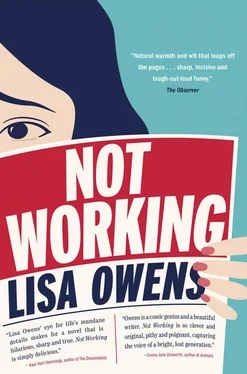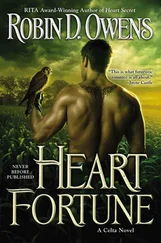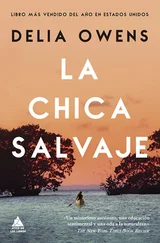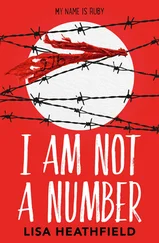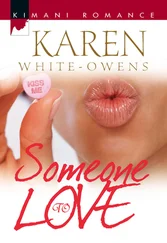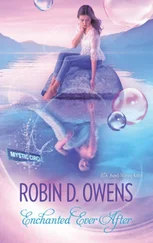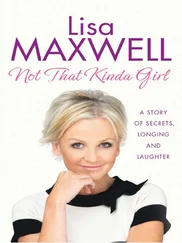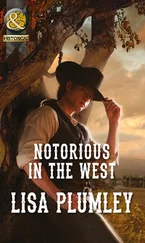“What is that?” says Jan, scanning the menu.
I point. “Sizzling garlic prawns, must be. Smells great. I think I might go for those, actually. What about you?”
“Oh no,” says Jan. “I wouldn’t want the attention.”
“So, Claire,” says Bob, before I can think of a response, “we haven’t seen you since Christmas, when you were on a mission to — as I think Luke described it — find yourself?”
“That’s one way of putting it.” I look at Luke, who is staring intently at the menu.
“Then my next question comes in two parts: a) have you succeeded in finding yourself? and b) — which is of course contingent on a) — where had you been all your life?”
“Ever the logician, Bob! Well. If the answer to a) is ‘Sadly no, not yet,’ the answer to b) must be ‘I’m still looking.’ ”
“But what do you think you’d like to do?” asks Jan. “You must have some idea.”
“Honestly,” I say, “this is what’s so hard. I know this is going to sound very vague but I’m keen to do something that means something. Not just glorified admin, as so many jobs seem to be nowadays.” They’re nodding, waiting for more, faces straining with the polite desire to understand, but there’s nothing else to come.
Then Jan breaks the silence, slapping her hand on the table. “Police force. There you are. Excellent benefits, job for life, making a difference to society.”
I’m about to laugh but catch myself when I see she’s not joking. I look to Luke for some assistance, but he’s enjoying himself too much. His head rocks in slow, delighted agreement. “It’s perfect, Mum. Claire loves interrogating, to really get in there and sweat the small stuff.” His eyes flicker to mine for the briefest second, and though the tone is light, there’s a private sting. “I can’t believe I didn’t think of it.”
Bob weighs in. “I can see you in the uniform. Yes, very smart. You’d look most…dependable.”
He means fat, I think sadly, picturing myself, dumpy in the trousers, chin bunched around the hat strap.
“Thank you,” I say. “Plenty of food for thought. Speaking of which, what’s everyone having?”
“I see what Luke means about interrogation!” says Bob, gaze roving to check everyone’s laughing.
The waiter arrives to take our order. I chicken out of the flamboyant prawns — opting for chow mein instead — and spend the rest of the meal steering the conversation as far from policing as possible.
“How’s the painting going, Bob?” I ask. Bob is an amateur watercolor artist — and serial gifter of his output to Luke and me.
“Good! Thank you for asking, Claire. I’m about to begin a series of local buildings, with a view to putting on an exhibition, hosted by the Historical Society.”
“Fantastic!” I say. “That sounds wonderful! Are there…any criteria for which buildings you choose, or do you just…go for the most attractive?” Sometimes, my resourcefulness really takes me by surprise.
While Bob answers, I keep flicking my gaze to Luke, who I suspect, despite the surface appearance of civility, is totally shutting me out. To confirm, I put my hand on his knee: no response.
“Claire’s very interested in heritage,” Luke says with sudden enthusiasm. “You applied for that job, didn’t you?”
“What job’s this?” says Jan, shooting forward in her seat.
“Oh”—I press my fingers hard into his leg—“it’s nothing. I mean, it was just a last-minute thing on the off-chance for…You know in London they have those blue plaques?”
“Of course,” says Bob. “We have them here too. A wonderful scheme. Well, that sounds terrific! Good for you. When will you hear?”
“No — I already found out. I didn’t get it,” I say, sitting on my hands to try and stop squirming. “It was ages ago, before Christmas — just a stupid spur-of-the-moment application. I don’t know why Luke mentioned it.”
“Well, I’m sure you’ve got plenty of other fingers in the fire,” says Jan.
“I hope not …” says Bob, shielding his mouth with his hand, stage-whispering out of the side of it as though Jan can’t hear.
“Irons, rather,” says Jan, cross with herself for the mistake. “Fingers in pies.”
But having set up his punch line, Bob won’t be put off. “Fingers in the fire! That would be a bit painful!”
“Are you waiting to hear back from lots of other places, or…?” Jan asks.
“Well,” I say, wrenching apart my wooden chopsticks, “not as such. Applications are so time-consuming, and if I’m not sure what I want, it feels like a waste to go through all the stages for something that might not be right anyway. I’m mainly doing lots of reading and research at the moment, into different avenues I could take.”
“Right,” says Jan distantly.
“Hey — what sort of frame did you guys end up choosing for the lake view?” Bob asks, no doubt sensing my discomfort. He’s referring to our Christmas present, a muddy scenic piece of his that went straight on top of the wardrobe. I look to Luke, ready to comply with his story, glad of the opportunity to be reunited, however briefly, in benign deceit, but he doesn’t yield an inch.
“Sorry, Dad, we haven’t got round to it yet. It’s been a bit crazy this year between work and exams. I’ll take it in next week to be done,” says Luke, then adds, “or Claire might if she has a spare moment.”
—
Back at the house, we drink tea at the kitchen table.
“Would you give me a hand setting up the new DVD player next door?” says Bob to Luke. “It’s defeated me so far, I’m afraid.”
Luke stands, nodding, draining his mug.
“How are your parents, Claire?” asks Jan when they’ve gone.
“Oh, they’re…both well, thanks. Nothing to report really. My mum—” I stop, not knowing where I’m going with this. My mother isn’t speaking to me, and my father may be about to lose his job. “She sends her regards. My dad too. They both do, to you and Bob.”
“Well, give them our best,” says Jan, plucking a fresh tissue from the box on the table and hooting into it before settling into a middle-distance stare.
I clear my throat, looking around the kitchen for something to say.
“Basil plants always die on me.” I nod at the thriving one on the windowsill. Jan doesn’t look surprised to hear it.
“You mustn’t be afraid to prune,” she says. “Pinch off any flowers immediately — sounds brutal, but that’s how to make it thrive.”
“Noted,” I say. Through the glass doors I can see Luke and Bob in the living room. Bob stands and intones like a priest from the manual, which rests on his open palms. Luke kneels by the television; his face and forearms glow blue in its light. “I give him a hard time sometimes, but he’s all right, really, isn’t he?”
“Who, Luke? Of course,” says Jan. “We’re all very lucky to have him.”
In the night, I wake and two things are wrong: I’m alone in the bed and need very much to be sick. I grope for the light switch, and when I find it — certain I won’t make it to the bathroom on time — I kneel over and retch into the bin by the door, leaking tears of strain and self-pity. When I’m done, I take a grim inventory of my output: one glistening serving of chicken chow mein. The sight provokes a few more fruitless heaves, until weak with relief and clammy with sweat, I curl up on the carpet to recover.
The bin, I see now, is actually more of an ornamental tin bucket, featuring an illustration of cats dressed as Victorian humans. One in a top hat reads a newspaper, perched on a fireside armchair. Another — the wife? — in a pink dress is brandishing a lorgnette in its paw (I summon “lorgnette” with surprising ease from the mists of childhood books featuring stern schoolmarms and Alpine boarding schools), and looking down on me through it with such haughtiness that I find myself nearly glad I was sick, if only to have answered this creation with the contempt it deserves.
Читать дальше
